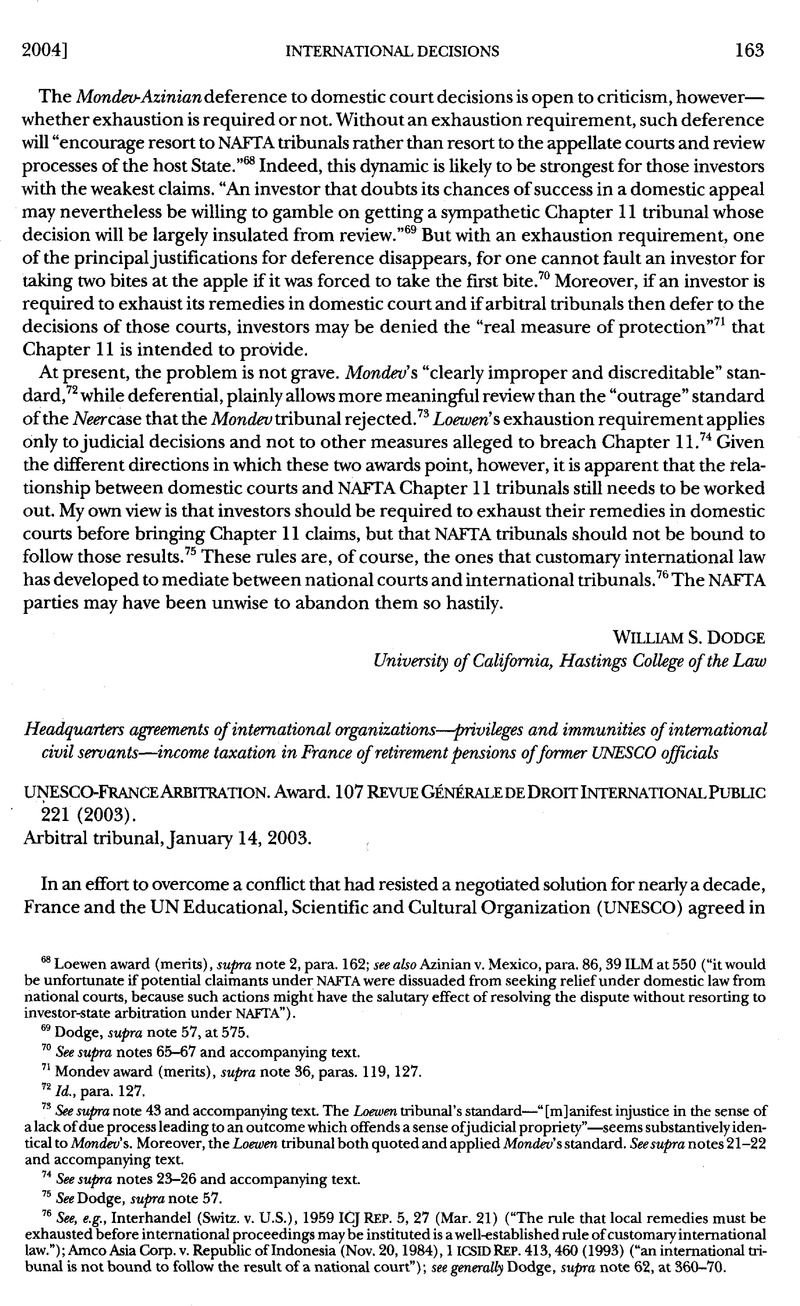No CrossRef data available.
Published online by Cambridge University Press: 27 February 2017

1 Headquarters Agreement, July 2, 1954, Fr.-UNESCO, 357 UNTS 5. Article 22(b) provides that “[o]fficials governed by the provisions of the Staff Regulations of the Organization:... (b) Shall be exempt from all direct taxation on salaries and emoluments paid to them by the Organization.”
2 The three-member tribunal, established by the parties pursuant to Article 29 of the Headquarters Agreement, comprised Jean-Pierre Quéneudec (appointed by France) and Nicolas Valticos (appointed by UNESCO), who, in turn, jointly selected Kéba MBaye as chairman. The Tribunal selected Ousmane Diallo as its registrar. The arbitra proceedings were conducted in French, and die award was thus also rendered in French. The arbitral award of January 14, 2003, was published at 107 Revue Générale de Droit International Public 221 (2003). For die purposes of this case report, the author has translated some passages from die award into English.
3 In determining the ordinary meaning of die terms “international civil servant” (fonctionnaire international), “retirement” (retraite), and “emolument” (émolument), the Tribunal relied not only on Petit Larousse and Dictionnaire de l’Académie, but also on Dictionnaire de la terminologie du droit international, Dictionnaire du droit international public, and Le vocabulaire juridique. See Arbitral award, supra note 2, paras. 47, 49.
4 Arbitral award, supra note 2, para. 13. The order of events was somewhat unusual in that the parties adopted a special submission agreement after the constitution of die Tribunal pursuant to the agreement to arbitrate contained in the Headquarters Agreement. Based on the submission agreement, the Tribunal then proceeded to adopt the terms of reference for the arbitration. In respect to procedure, the Tribunal decided that it would adopt, as necessary, procedural rules consistent with the Statute, Rules of Court, and practices of the International Court of Justice. The parties thereafter engaged in a double exchange of written pleadings, commenced by UNESCO. The oral argument before the Tribunal took place on August 30, 2002.
5 See Arbitral award, supra note 2, paras. 32–38.
6 May 23, 1969, 1155 UNTS 331.
7 Mar. 21, 1986, UN Doc. A/Conf. 129/15, 25ILM 543 (1986).
8 (Bots./Namib.), 1999 ICJ Rep. 1045,para. 18 (Dec. 13) (treating Article 31 of the Vienna Convention on the Law of Treaties as expressing a standard of customary international law in a case where neither party was party to that Convention).
9 Arbitral award, supra note 2, para. 76.
10 J.O., Mar. 1, 1976, p. 1398.
11 Arbitral award, supra note 2, para. 49.
12 Bulletin officiel des impots, Direction generale des impots, No. 55 (Mar. 24, 2003), at <http://alize.finances.gouv.fr/dgiboi/boi2003/5FPPUB/textes/5bl003/5bl003.htm>.
13 Feb. 13, 1946, 1 UNTS 15.
14 UN GAOR 6th Coram., 1st Sess., pt. 1, Summary Record of Meetings, Annex 3a, at 46–47, UN Doc. A/C.6/31 (1946).
15 UN GAOR 6th Coram., 1st Sess., pt. 2, Summary Record of Meetings, Annex 24, at 347, UN Doc. A/90 (1946).
16 See, e.g., Headquarters Agreement, IAEA-Aus., Dec. 12, 1975,IAEA Doc. INFCIRC/15/Rev.l.In an agreement dated November 29, 1995, Austria confirmed, with respect to all UN organizations in Vienna, the position established in its April 13, 1967, headquarters agreement with the UN Industrial Development Organization.
17 See Regulation (Euratom, ECSC, EEC) No. 549/69 of the Council of 25 March 1969 Determining the Categories of Officials and Other Servants of the European Communities to Whom the Provisions of Article 12, the Second Paragraph of Article 13 and Article 14 of the Protocol on the Privileges and Immunities of the Communities Apply, 1969 O.J. (L 74) 1.
18 The question of a customary international law norm is discussed, for example, in the French case In re Aquarone, Conseil d’Etat, June 6, 1997, La Semaine Juridique 1997, II, 22, 945, reprinted in 101 Revue gÉnÉrale de droit international public 838 (1997)Google Scholar; see Stefan, A. Riesenfeld, Case Report: In re Aquarone, 92 AJIL 764 (1998).Google Scholar
19 Arbitral award, supra note 2, para. 31.
20 See, for example, the explanations provided in IRS Publication Nos. 939, 575, and 721.